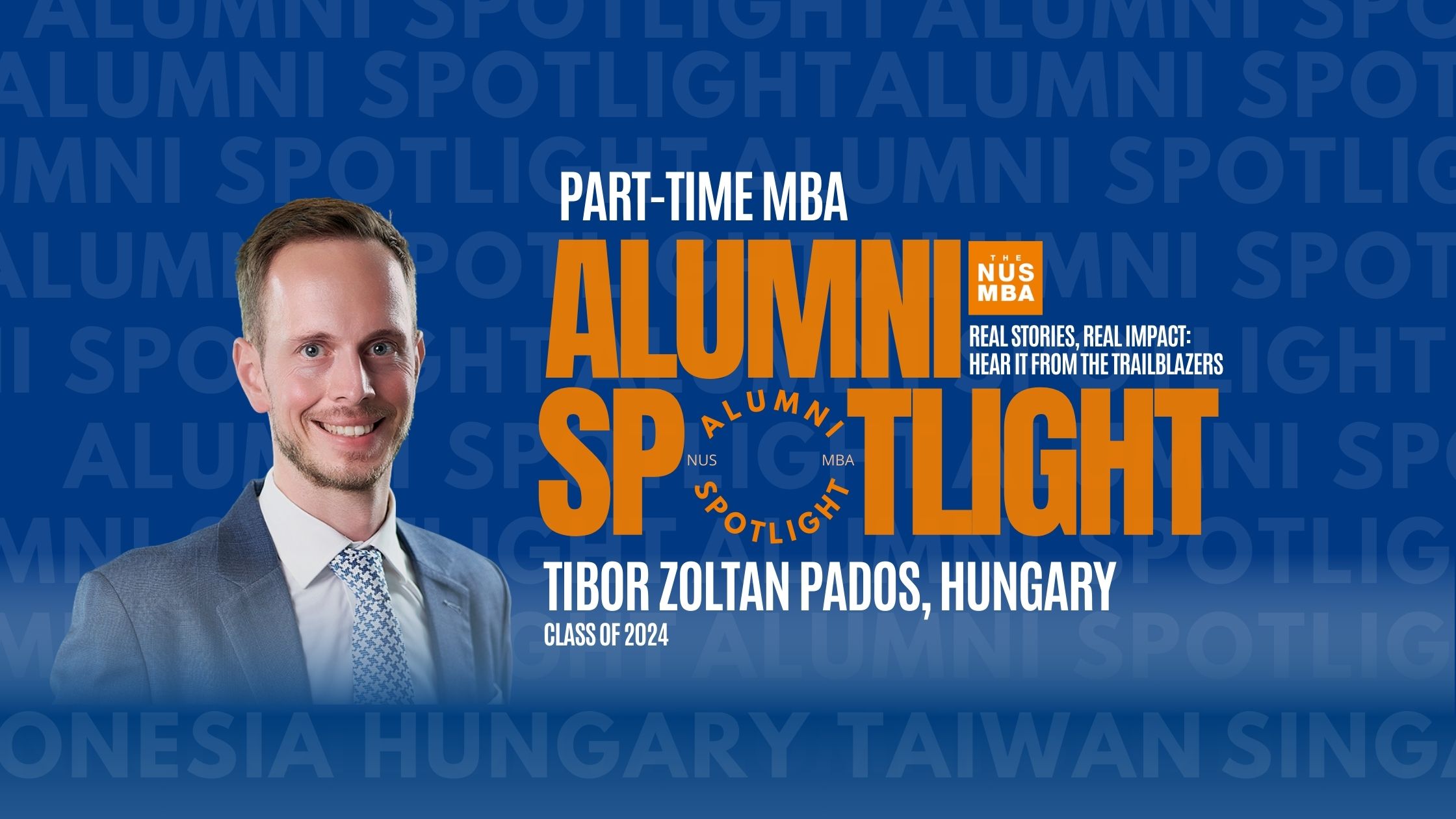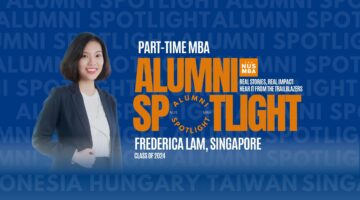Tibor Pados on Balancing Career, Family, and Lifelong Learning
“The MBA is not a sprint but a marathon where maintaining the right pace and energy level is key to success” – Tibor Pados on balancing career, family, and lifelong learning
Hungary, Part-time MBA, Class of 2024
Current role: Senior Manager, Marketing Execution & Operations – Asia Pacific
With over a decade of experience in the hospitality industry, including regional roles across Europe and Asia, Tibor Pados knew that an advanced degree would give him a stronger strategic foundation. But timing was everything.
After relocating to Asia and navigating a global pandemic, Tibor realised it was now or never. The NUS Part-time MBA stood out for its strong reputation, flexibility, and ability to blend Western business models with an Asian perspective—an invaluable asset for someone planning to build their career in the region.
Balancing work, family, and studies was no easy feat, especially with a new job and two young children. But with the support of his family and the right mindset, he powered through the challenges. “The MBA is not a sprint, but a marathon,” he reflects. In this interview, Tibor shares why he chose NUS, how he managed his commitments, and the key lessons that shaped his journey.
What motivated you to pursue an MBA, and how did you know it was the right time to take this step in your career?
I always knew I wanted to pursue a master’s degree but not immediately after completing my bachelor’s. Early in my career, I prioritized gaining practical experience, understanding if I truly enjoyed my field, and identifying any knowledge gaps I might need to address later.
After four years of work in my home country, I took my first overseas assignment in a regional role for a global hospitality company. It was a significant shift, and I focused on settling into my new environment. At that point, I chose to pursue a diploma in digital marketing from the Chartered Institute of Marketing to meet the evolving demands of my role.
After spending four years in the UK, I made another big move to Asia. Again, my priorities centered on settling down and family planning. Then came the pandemic, which, despite its challenges, provided valuable time for self-reflection. I realized that pursuing an MBA was now or never. The credential had become increasingly common in job postings and was a clear pathway for personal and professional growth.
When I joined the program, I brought 14 years of work experience, which was already above the class average. This allowed me to approach the coursework with a mature perspective and contribute insights shaped by a broad range of professional experiences that I had built up over the years in both Europe and Asia. Given the evolving demands of the business landscape, it felt like the right moment to strengthen my strategic capabilities and broaden my global outlook.

Why did you choose the NUS part-time MBA program, and what aspects of the program stood out to you compared to others?
Three key factors influenced my decision to choose the NUS part-time MBA program:
Reputation: The NUS MBA is consistently ranked as one of the top programs in Asia and is renowned for its strong Asian perspective. This was particularly valuable to me, having spent most of my life and professional career in Europe. Given my plans to stay in the region for at least the foreseeable future, I saw it as an excellent opportunity to deepen my understanding of business practices and market dynamics in Asia. The program’s ability to blend Western business models with key leadership insights from an Asian viewpoint made it a compelling choice.
Affordability: Compared to other top MBA programs in Singapore, the NUS MBA is competitively priced. As a fully self-funded student, I considered it a worthwhile financial risk given my other ongoing commitments.
Part-time format: This was critical for me, as taking a full-time study break was not feasible due to the high opportunity cost, particularly considering my professional tenure and personal commitments. While a full-time MBA is likely to have allowed for greater participation in networking events, the part-time program offered the right balance, enabling me to continue advancing my career while pursuing further education.
You participated in a short exchange program at UC Berkeley, Haas School of Business. How did this experience complement your learning at NUS and broaden your global perspective?
NUS offers a wide range of exchange opportunities with top business schools globally, and I made it a priority to take part in one. Having completed my undergraduate degree in Europe and pursued my MBA in Asia, the U.S. seemed like the perfect way to complete my global academic journey. I chose UC Berkeley’s “Bay Area Innovation & Entrepreneurship” program, as it aligned with my interests and preferences, but also came highly recommended by students who had completed it in the previous year.
The program was structured around two professors—one focusing on the founder’s perspective and the other on the investor’s point of view. The hands-on nature of the course was particularly engaging; we had to develop and present a startup idea, which allowed us to hone our pitching skills. Another exercise focused on structuring an investment fund, which gave us insight into how venture capital firms assess opportunities
In addition to the lectures, we had the opportunity to interact with industry experts through fireside chats, further enriching the learning experience. We also visited companies to gain firsthand insights into innovation ecosystems and cutting-edge technologies. While the course itself was only four days long, it provided valuable exposure to the startup landscape in Silicon Valley and allowed us to network with both MBA and EMBA students, a first for me.
As a husband and father of two, how did the flexibility of the NUS part-time MBA help you balance work, family, and studies?
The flexibility offered by the NUS part-time MBA was invaluable, but balancing work, family, and studies proved to be the most challenging period of my life. It was truly rewarding but incredibly demanding. As if it weren’t hard enough, I made it even more difficult by starting a new job around the same time I began the program, which, as anyone who’s switched jobs knows, is already an intense experience.
Throughout the journey, there were times when I inevitably let people down—family, colleagues, fellow students, or even professors. Fatigue was real, and I had moments where I genuinely struggled to keep up. As many students have noted here in this blog, an MBA is not a sprint but a marathon, and finding the right pacing—and maintaining energy levels—was crucial. But I’m glad I persevered and made it through. Over time, I worked hard to make up for any shortcomings, or at least I tried, and I hope I made at least a few of them proud of my achievement.
One of the key factors in my success was having a strong support network, which played a significant role in helping me complete the program. I’m forever grateful to them!
I also appreciated the flexibility of the NUS MBA in setting my own pace. While it was tempting to be distracted by the pace of other students at times, I often reminded myself that it’s not a race. The option to choose between weekday evening or weekend classes, along with intense weeks where full-day classes were held Monday to Friday, helped me manage my life effectively. Although taking study leave for those weeks wasn’t an option for me, I found intense modules incredibly valuable for a part-time student like myself, as they allowed me to focus fully on my studies and connect with fellow classmates.

How has the MBA influenced your career in the hospitality industry? Are there specific skills or insights you’ve applied directly to your work?
The MBA helped me develop a combination of both soft and hard skills. It boosted my confidence, not only by completing such a prestigious program but also by highlighting the valuable work experiences I could share with my peers. Peer-to-peer learning played a vital role throughout the program, and I appreciated how my background enabled me to contribute meaningfully to group discussions and projects.
Time management was a crucial skill I honed, particularly when juggling multiple assignments and responsibilities. I also significantly improved my presentation skills—both in content creation and delivery—as frequent presentations were a key part of the coursework.
The program also equipped me with technical skills, including solving descriptive analytic problems with Power BI, running regression analyses, and building optimisation models. These skills have proven valuable in addressing data-driven challenges in my professional life.
The program broadened my understanding of the Asian business landscape and gave me fresh perspectives, especially through numerous case studies across various industries. A key highlight of the MBA was the NUS Consulting Project, where our group worked with a leading Singapore-based health startup. Over 12 weeks, we identified key operational challenges and developed strategic recommendations to improve the efficiency of their B2C operations team using generative AI. The project was dynamic, as the landscape shifted rapidly, requiring us to remain agile and adapt to new developments. This experience not only sharpened my problem-solving skills but also taught us how to align innovative solutions with real-world challenges, delivering a proof of concept that directly addressed the client’s needs.
What advice would you give to other working professionals, especially parents, considering the NUS part-time MBA but unsure about balancing their commitments?
Start Early
If you can, pursue the MBA before having children—fewer commitments mean more time and energy to network and engage fully with the program. In my view, the sweet spot is between 5 to 10 years of work experience. That said, it’s absolutely achievable even with kids, as I and many others have proven. I’ve seen classmates manage pregnancy, newborns, and young children while still completing the program. Remember, it’s not a race—you can take your time.
Set Boundaries
I personally waited until my youngest child was at least a year old because the first year with a baby was intense for me. Setting clear boundaries is essential—decide when you’ll switch off each day and stick to it. My second semester was particularly tough. Work became more demanding, and I chose challenging modules, often staying up until 2 a.m. Fatigue sets in, affecting both home and work life. I learned to be more disciplined, capping studying by midnight unless a critical deadline required extending it to 1 a.m. at most. I also became more thoughtful and realistic when selecting modules.
Plan Smartly
Time management will become your greatest superpower; without it, this marathon can easily overwhelm you. Schedule time for classes, studying, family, and friends—and when you commit, be fully present. Quality time matters more than quantity. Prioritising your partner, who will likely be your strongest support, is essential. One valuable tip I received was to mix family time with bonding opportunities by connecting with fellow students who also have kids.
Communicate Regularly
Have open conversations with your partner, family, and boss about the demands ahead. Keep them updated on your progress and any schedule changes.
Stay Active
Lastly, don’t neglect exercise. I made that mistake and regretted it—mental fatigue without physical release affected my sleep quality.


